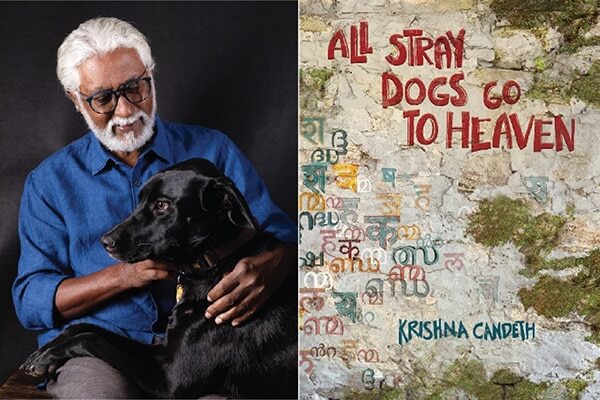Exploring the power of love, friendship, family, and home, the new Krishna Candeth book All Stray Dogs Go to Heaven is an astounding debut novel. Told from multiple perspectives and weaving dreams and reality, the book revisits our own ideas of truth and self.
Vishnu Makhijani (VM): The book is a string of stories that come together as one big story. How did you go about writing the book this way?
Krishna Candeth (KC): You should never ask an author how they go about writing their books because the simple answer is they don’t know. Everything they write supposedly comes from their imagination, but they don’t know how that imagination works. The real question has to do with how stories are told. Are ‘good stories’ good because of a certain succession of events or because of the way those events are narrated?
VM: There are no chapters in the book, only subheadings; why’s that?
KC: You might call the structure episodic. It allowed me to write certain episodes ahead of others, and that was an advantage because I knew how they were going to link up in the end. I was vaguely conscious this was a structure used mostly in non-fiction, but I went ahead with it anyway because that was how I had originally conceived the book.
The episodic structure allowed the story to expand, to grow sideways rather than go shooting off towards some intended conclusion; I can’t remember who it was who said ‘you don’t write a book as the crow flies’. A novel in its traditional form offers a very particular linear pleasure, but there is a more ambiguous delight in absorbing the information or random observations from episodes in no particular order.
VM: Who do you hope to reach with this story?
KC: I suppose at one level we all write the books we like to read; there is a layer of sediment we kick loose and bring up to the surface when we write a novel, and sometimes the colour or density of that sediment may both attract and repel readers.
I like to think of the novel as a small device that ignites in us a sense of wonder. We try to discover or uncover something when we write. We may not be sure what it is, but it often turns out to be some form of emotional truth. One hopes that the reader will come to detect it and, whilst reading, be affected by it.
VM: The book weaves past and present through multiple perspectives. How did you go about sketching the characters in the book?
KC: In ‘The Unbearable Lightness of Being’, a book that made a huge impression on me when I first read it, Milan Kundera talks of how characters are not born like people of a woman; they are born of a situation, a sentence, a metaphor containing a basic human possibility that the author thinks no one else has discovered.
Coming back to the characters in the novel, I had imagined most of them as vagabonds, as stray dogs who wander the streets of their own imaginations. Like a lot of us, they live simultaneously in the past and in the present, in daydreams and delusions, and you can call the resulting mixture ‘reality’ if you so desire.
VM: What is the novel about? What do you want to leave readers with?
KC: It’s about those thoughts and feelings that are forever knocking about in the great bazaar of our heads and hearts, and the stories big and small, half or fully formed that appear without warning. When writing I would think of it as an imagined report about something a friend and I had talked about a long time ago and then forgot, about buried facts and feelings, about things — cruel and unforgiving — that had happened in the past and might well happen again in the future.
If there was something I would like the reader to be left with, it is the sense of how all the stories and events add up and accumulate in the course of the narrative. The reason why all these states of mind and place co-exist on the page without being too disruptive has to do really with the form of the novel. It is so wonderfully elastic: it accommodates, expands, it has room for everything. It can be in one place at one moment, and all over the place, the next.
I hope the novel is never in danger of being too moralistic, because it is really the most generous and unpuritanical of forms.
The debut Krishna Candeth book, All Stray Dogs go to Heaven is available here.
READ ALSO: ‘The Peripheral’ by Meena Kumar





